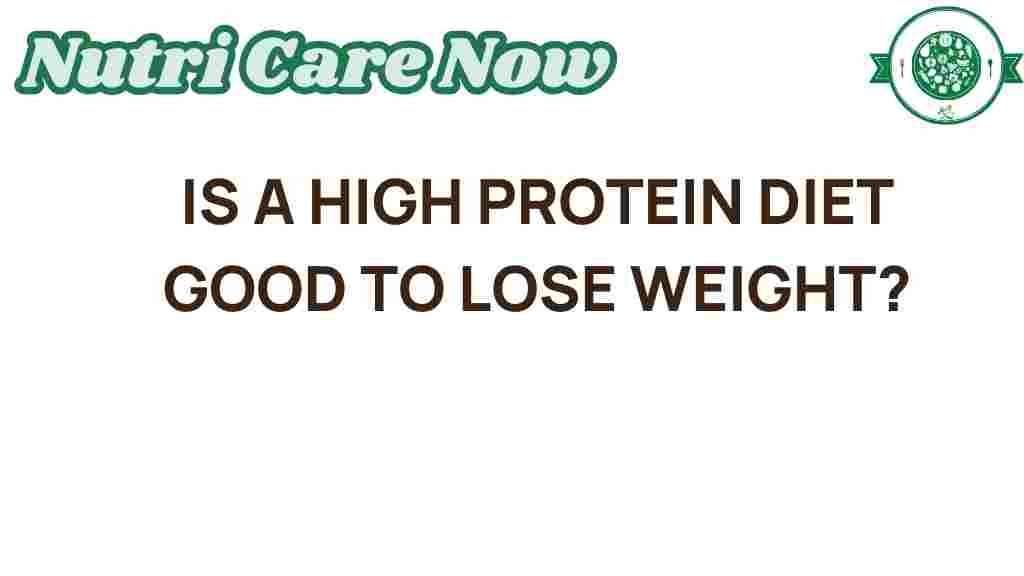Unpacking the Truth: Is a High Protein Diet Effective for Weight Loss?
In recent years, the high protein diet has gained significant popularity among those seeking effective weight loss strategies. With countless studies emphasizing the role of protein in nutrition, metabolism, and overall health benefits, many individuals are curious whether a high protein diet is the key to shedding unwanted pounds. In this article, we will delve into the effectiveness of high protein diets for weight loss, explore the intricacies of meal planning, discuss various protein sources, and provide dietary strategies that can help you achieve your fitness goals.
Understanding the High Protein Diet
A high protein diet typically consists of foods that are rich in protein while limiting carbohydrates and fats. This dietary approach is believed to enhance satiety, reduce cravings, and promote muscle preservation during weight loss. Before adopting this type of diet, it is essential to understand its components and how it can be integrated into your lifestyle.
The Science Behind Protein and Weight Loss
Protein plays a critical role in our bodies, impacting several physiological processes. Here are some key points on how protein influences weight loss:
- Increased Satiety: High protein meals can increase feelings of fullness, leading to reduced calorie intake throughout the day.
- Higher Thermic Effect: Protein has a higher thermic effect compared to carbohydrates and fats, meaning your body uses more energy to digest and metabolize protein-rich foods.
- Muscle Maintenance: When losing weight, preserving muscle mass is crucial. A high protein diet helps maintain muscle during caloric deficits.
- Improved Metabolism: Increased protein intake can boost metabolic rate, helping you burn more calories even at rest.
Health Benefits of a High Protein Diet
Beyond weight loss, a high protein diet offers several health benefits:
- Improved Bone Health: Adequate protein intake supports bone density and health.
- Better Blood Sugar Control: High protein diets can stabilize blood sugar levels, reducing the risk of type 2 diabetes.
- Enhanced Recovery: Protein aids in muscle recovery after exercise, making it beneficial for those engaged in fitness activities.
Meal Planning for a High Protein Diet
Effective meal planning is essential for successfully following a high protein diet. Here are some tips to help you create balanced meals:
- Identify Protein Sources: Focus on lean meats, fish, dairy, legumes, and plant-based proteins. Aim for a variety of sources to ensure you get all essential amino acids.
- Incorporate Protein into Every Meal: Each meal should contain a good source of protein. Consider Greek yogurt for breakfast, grilled chicken for lunch, and lentils for dinner.
- Snack Wisely: Choose high protein snacks like nuts, string cheese, or protein bars to keep hunger at bay.
- Plan Ahead: Prepare meals in advance to avoid the temptation of low-protein options.
Dietary Strategies for Success
Implementing a high protein diet requires more than just eating protein-rich foods. Here are some dietary strategies to maximize your weight loss efforts:
- Track Your Intake: Use a food diary or app to monitor your protein intake and ensure you meet your dietary goals.
- Balance Macronutrients: While protein is vital, ensure you’re also getting healthy fats and carbohydrates for overall nutrition.
- Stay Hydrated: Drinking water is crucial for metabolism and can also help control hunger.
- Be Mindful of Portions: Even high protein foods can contribute to weight gain if consumed in excessive amounts.
Protein Sources to Consider
When adopting a high protein diet, selecting the right protein sources is key. Here are some excellent options:
- Animal Sources:
- Chicken breast
- Turkey
- Fish (salmon, tuna)
- Eggs
- Dairy (Greek yogurt, cottage cheese)
- Plant-Based Sources:
- Legumes (lentils, chickpeas)
- Quinoa
- Tofu and tempeh
- Nuts and seeds
- Edamame
Common Challenges and Troubleshooting Tips
Transitioning to a high protein diet may come with challenges. Here are some common issues and how to overcome them:
- Feeling Overwhelmed: Start gradually by incorporating more protein into your meals, rather than a complete overhaul.
- High Costs: Look for sales on lean meats or consider plant-based proteins, which can be more economical.
- Lack of Variety: Experiment with different recipes and cooking methods to keep meals exciting.
- Digestive Issues: If you experience digestive discomfort, assess your fiber intake and ensure you’re increasing it gradually.
Conclusion: The Bottom Line on High Protein Diets
In summary, a high protein diet can be an effective strategy for weight loss, thanks to its ability to enhance satiety, boost metabolism, and preserve muscle mass. By understanding the science behind protein, planning nutritious meals, and selecting diverse sources of protein, you can create a sustainable dietary approach that supports your fitness goals.
As with any dietary change, it’s advisable to consult with a healthcare professional or a registered dietitian to tailor a plan that best suits your individual needs. For further reading on nutrition and health benefits, check out this comprehensive guide on healthy eating strategies.
Embrace the power of protein and take the first step toward a healthier, fitter you!
This article is in the category Diet and created by NutriCareNow Team
